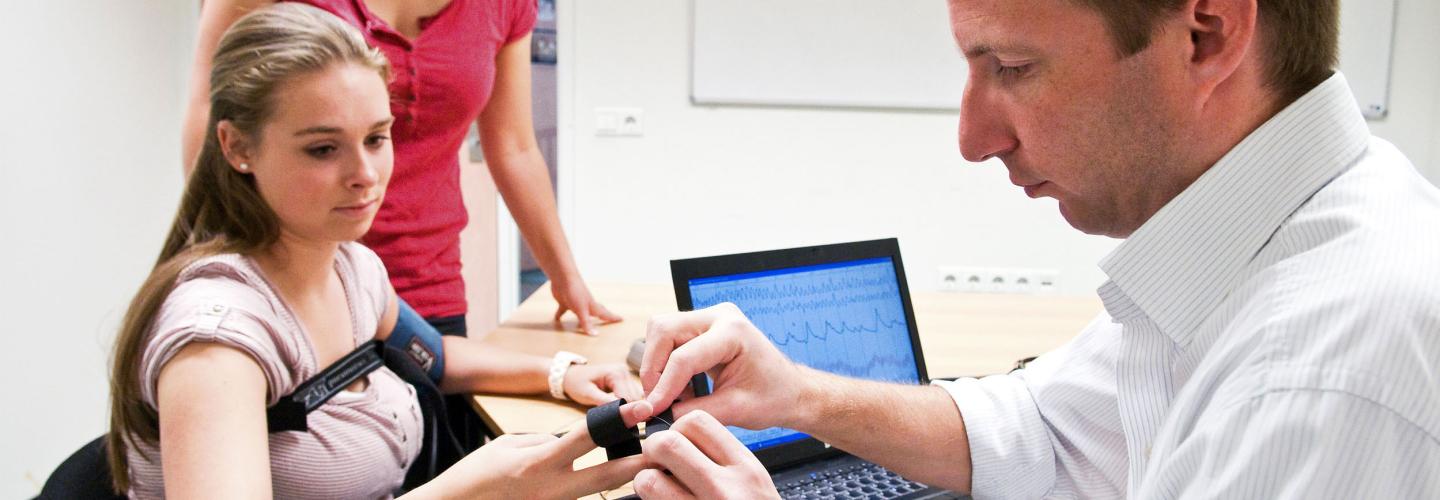Why this programme
The master Forensic Psychology is a highly challenging programme that operates at the intersection of psychology and justice. The programme prepares you for a career as a scientist-practitioner in the forensic mental health field. You will learn about the psychology of people who come into contact with the law, but also of people who are victims of abuse and violence. You will receive training in specialised forensic psychological skills, such as forensic assessment, forensic therapy, and writing expert witness reports.
As a forensic psychologist, you will be called upon to answer a broad range of questions, such as:
- Is there a relationship between the mental disorder of a suspect and their behaviour during the alleged crime?
- What is the risk that someone will re-offend in the future?
- What is the likelihood that this vulnerable suspect has made a false confession?
- Has this child been a victim of sexual abuse and what would you advise to prevent re-abuse?
The group of clients you will work with will be diverse and demanding. They may show severe antisocial behaviour and/or co-morbid mental disorders (such as schizophrenia combined with substance use disorders). Often, forensic clients have also been seriously victimised themselves during their lifetime.
You will need knowledge in the field of criminal and juvenile law, as well as human rights and professional ethics for forensic psychologists. The programme contains a diverse set of courses that will provide you with the necessary knowledge and basic skills set to answer complex forensic psychological questions.
Student profile
This programme is a good fit if you...
- want to pursue a career in forensic mental health
- have scientific curiosity and an eagerness to learn
- are open-minded and well-balanced
- are willing to work hard both independently and in groups
Select group of talented students
The Forensic Psychology programme accepts 24 students a year and receives about 150-200 applications. Your fellow students will therefore be a select group of talented, ambitious students who are all willing to work hard in their studies. As this course involves a lot of group work and discussion, it will help bring out the best in you.
International classroom
From day one, you’ll be challenged with differing viewpoints and experiences as you interact with staff and students from all over the world. Your preconceptions and worldview will be enhanced by this interaction, bringing you closer to the programme’s goal of teaching students not only facts and concepts but also international accessibility and understanding. Roughly 50% of the students in this master’s programme come from outside the Netherlands. Such diversity creates an international atmosphere that is strengthened by the international orientation of the programme.
Study abroad
You can opt to spend your internships (clinical and/or research) at one of our partner institutes across the globe. It should be noted, however, that the COVID pandemic and the Brexit have had a limiting impact on student mobility in the Forensic Psychology programme. This means, we cannot guarantee an international placement for all students any longer.
Problem-Based Learning
At Maastricht University we use Problem-Based Learning (PBL). You will work in small groups of up to twelve students on ‘problems’ inspired by real-world issues. You will discover factual knowledge, but also learn to collaborate with others, give presentations, conduct scientific research, and practice professional skills. Together, you will seek solutions and come up with answers. You'll work independently, but you will typically be guided by a tutor or mentor.
Research and clinical internships
At the Faculty of Psychology and Neuroscience, we consider internships an indispensable experience. Internships not only enhance your studies by giving you practical experience, but they also give you an edge when looking for a job. The Forensic Psychology programme therefore contains both a clinical and a research internship in the second year, during which you will have the opportunity to put both your research and your clinical skills into practice. Dutch-speaking students are also offered the opportunity to fulfill entrance requirements (e.g. ‘basisaantekening psychodiagnostiek NIP’) for professional post-master’s training programmes in the Netherlands.
"I'm interning at a Munich correctional facility. I participate in group therapies and in preparing special topics for anti-aggression therapies, and am even allowed to lead part of these. I've also rated one of the prisoners on the PCL-R (Psychopathy Checklist-Revised) and was asked to rate more of them. My courses have prepared me really well to do all of this."
Annina Schlachta
